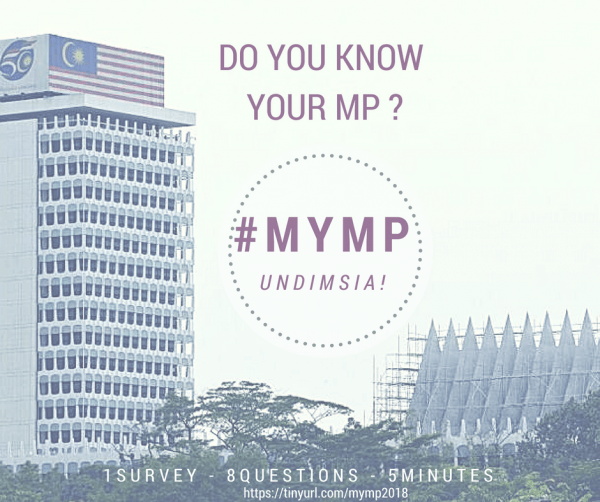The MyMP project is a website that provides an introduction to Members of Parliament (MPs) in Malaysia. It aims to provide opportunity for the voters to get to know their MPs, enhance closer relationship between the voters and MPs, and to educate voters about parliamentary democracy.
1. Introduction
The Malaysian Centre for Constitutionalism and Human Rights (MCCHR) under its UndiMsia! programme conducted a national online survey for two weeks from 11 to 25 July 2018. This survey is part of an ongoing UndiMsia! project, called MyMP. The survey evaluates a number of factors, including:
i. Whether voters knew their MPs;
ii. Voter interest in engaging and communicating with their MPs;
iii. Voter difficulties in trying to communicate with their MPs; and
iv. Questions that voters want to ask their MPs.
2. Summary
The survey consisted of three main parts:
A. Awareness
Part A evaluated how well citizens knew their MPs and their constituency.
B. Engagement
Part B focused on assessing how difficult it is for voters to communicate and get in touch with their MPs about issues affecting them, and voter desire to engage with their MPs.
C. Personal Information
Part C gathered basic information about the respondents profile. We also gave respondents the opportunity to write questions to their MPs.
The survey was conducted in Malay and English using Google Forms. It was shared on social media platforms, namely UndiMsia’s Twitter, Instagram and Facebook.
3. Main findings (percentages rounded off to the nearest 0.1%)
3.1 404 people responded to the survey.
3.2 78.5% of the respondents took the survey in English, the rest in Malay.
3.3 Main demographics:
3.3.1 21.0% of the respondents were between 18 and 24 years old.
3.3.2 36.1% of the respondents were between 25 and 34 years old.
3.3.3 24.8% of the respondents were between 35 and 44 years old.
3.3.4 53.0% of the respondents were from Selangor and Kuala Lumpur.
3.4 Awareness
3.4.1 91.8% of respondents knew their MP.
3.4.2 92.5% of respondents knew their federal constituency.
3.4.3 A majority of respondents viewed the main role of their MPs to be:
– debating and passing laws at the national level; and
– ensuring state public facilities are in good order.
3.5 Engagement
3.5.1 Respondents were asked to evaluate the difficulty they experienced in communicating with their MP on a scale of 1 (very difficult) to 10 (very easy):
– 40.8% of respondents answered with values less than 5, of which 14.4% answered with value 1; and
– 36.4% of respondents answered with values more than 5, of which 5.7% answered with value 10.
3.5.2 Respondents were asked to evaluate how much they wished to communicate with their MPs on a scale of 1 (I do not want or need to contact my MP) to 10 (I want or need to communicate with my MP):
– 7.9% of respondents answered with values less than 5, of which 3.2% answered with value 1; and
– 80.6% of respondents answered with values more than 5, of which 28.0% answered with value 10.
4. Conclusion
Although most of the respondents are aware of their constituency and their MP, they generally find it difficult to communicate and engage with their elected representative. A vast majority of the respondents expressed the desire to communicate and engage with their MP. Most of the respondents had specific questions on issues that affect them that they wish to share with their MP. The topics frequently mentioned were:
i. Employment issues, especially for youths
ii. How to communicate with the MP and stay informed about progress
iii. Child marriage
iv. Refugee/immigration issues
v. Plans and promises for the future
vi. Further engagement on social media
vii. Reforming education and empowering youths
viii. Transportation and housing issues.
You can also access the report here – MyMP Survey Report_final

